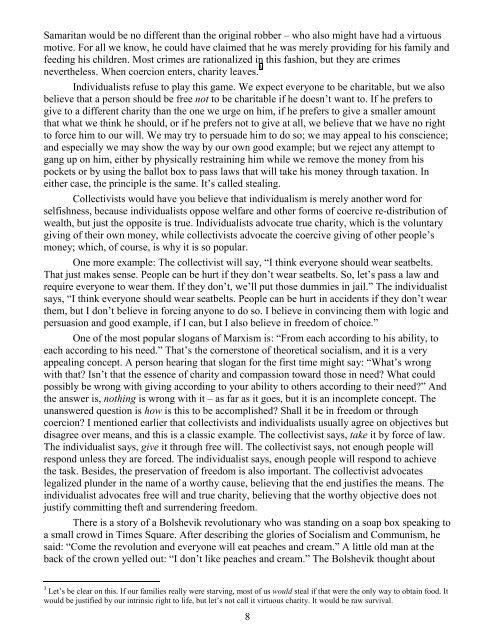Griffin, Edward - The Chasm-Collectivism vs ... - preterhuman.net
Griffin, Edward - The Chasm-Collectivism vs ... - preterhuman.net
Griffin, Edward - The Chasm-Collectivism vs ... - preterhuman.net
Create successful ePaper yourself
Turn your PDF publications into a flip-book with our unique Google optimized e-Paper software.
Samaritan would be no different than the original robber – who also might have had a virtuousmotive. For all we know, he could have claimed that he was merely providing for his family andfeeding his children. Most crimes are rationalized in this fashion, but they are crimesnevertheless. When coercion enters, charity leaves. 3Individualists refuse to play this game. We expect everyone to be charitable, but we alsobelieve that a person should be free not to be charitable if he doesn’t want to. If he prefers togive to a different charity than the one we urge on him, if he prefers to give a smaller amountthat what we think he should, or if he prefers not to give at all, we believe that we have no rightto force him to our will. We may try to persuade him to do so; we may appeal to his conscience;and especially we may show the way by our own good example; but we reject any attempt togang up on him, either by physically restraining him while we remove the money from hispockets or by using the ballot box to pass laws that will take his money through taxation. Ineither case, the principle is the same. It’s called stealing.Collectivists would have you believe that individualism is merely another word forselfishness, because individualists oppose welfare and other forms of coercive re-distribution ofwealth, but just the opposite is true. Individualists advocate true charity, which is the voluntarygiving of their own money, while collectivists advocate the coercive giving of other people’smoney; which, of course, is why it is so popular.One more example: <strong>The</strong> collectivist will say, “I think everyone should wear seatbelts.That just makes sense. People can be hurt if they don’t wear seatbelts. So, let’s pass a law andrequire everyone to wear them. If they don’t, we’ll put those dummies in jail.” <strong>The</strong> individualistsays, “I think everyone should wear seatbelts. People can be hurt in accidents if they don’t wearthem, but I don’t believe in forcing anyone to do so. I believe in convincing them with logic andpersuasion and good example, if I can, but I also believe in freedom of choice.”One of the most popular slogans of Marxism is: “From each according to his ability, toeach according to his need.” That’s the cornerstone of theoretical socialism, and it is a veryappealing concept. A person hearing that slogan for the first time might say: “What’s wrongwith that? Isn’t that the essence of charity and compassion toward those in need? What couldpossibly be wrong with giving according to your ability to others according to their need?” Andthe answer is, nothing is wrong with it – as far as it goes, but it is an incomplete concept. <strong>The</strong>unanswered question is how is this to be accomplished? Shall it be in freedom or throughcoercion? I mentioned earlier that collectivists and individualists usually agree on objectives butdisagree over means, and this is a classic example. <strong>The</strong> collectivist says, take it by force of law.<strong>The</strong> individualist says, give it through free will. <strong>The</strong> collectivist says, not enough people willrespond unless they are forced. <strong>The</strong> individualist says, enough people will respond to achievethe task. Besides, the preservation of freedom is also important. <strong>The</strong> collectivist advocateslegalized plunder in the name of a worthy cause, believing that the end justifies the means. <strong>The</strong>individualist advocates free will and true charity, believing that the worthy objective does notjustify committing theft and surrendering freedom.<strong>The</strong>re is a story of a Bolshevik revolutionary who was standing on a soap box speaking toa small crowd in Times Square. After describing the glories of Socialism and Communism, hesaid: “Come the revolution and everyone will eat peaches and cream.” A little old man at theback of the crown yelled out: “I don’t like peaches and cream.” <strong>The</strong> Bolshevik thought about3 Let’s be clear on this. If our families really were starving, most of us would steal if that were the only way to obtain food. Itwould be justified by our intrinsic right to life, but let’s not call it virtuous charity. It would be raw survival.8








![The Big Lie 9-11 and Government Complicity in Mass Murder [PDF]](https://img.yumpu.com/50957077/1/190x245/the-big-lie-9-11-and-government-complicity-in-mass-murder-pdf.jpg?quality=85)







